Missouri History
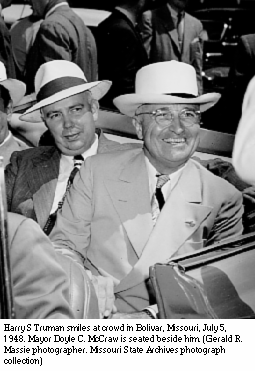
Harry S Truman
A 50th Anniversary
Commemoration of
His Presidency
by Robert H. Ferrell
No Missourian, nor for that matter, any citizen of any of the 50 states, needs reminding that half a century ago a Missourian became president of the United States. But the passage of 50 years does give opportunity to reflect upon what Harry S Truman brought with him to the White House in 1945 and what he accomplished in the momentous eight years that followed.
A Missouri Upbringing
As for what he brought, it was assuredly his varied background and experiences from Missouri: growing up on a series of Missouri farms, living for a while in Independence and then for three years 1903 06 in Kansas City. Remembering his sudden rise to power and his prominent political role during World War II, people often forget that Truman served a remarkable political apprenticeship as well as a county judge and Senator before reaching the vice presidency in January 1945. These experiences shaped his character and prepared him for what, three months later, was to come.
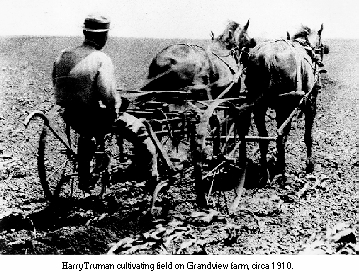
All of these things, but perhaps especially the farm, influenced Truman. As his mother once remarked, "It was on the farm that Harry got his common sense. He didn't get it in town." Truman was born in 1884, in the farm community of Lamar, 120 miles south of Kansas City, but his parents soon moved from the village to the farm. Although he lived and attended grade and high school in Independence, the later president returned to his grandparents' farm in 1906 and remained there until he left for France and World War I in 1917. He often spoke of himself as a farm boy. One can almost see him in those farm years before the war, walking or riding behind horses or mules or both, or engaged with a hoe, cleaning out the corn rows.
But however deep the impress of the farm, the town and city experiences helped shape his character and his fate as well. Independence in the 1890s marked his going to school, and he graduated from Independence High School in 1901. Most importantly, the class of 41 scholars included Elizabeth "Bess" Wallace, whom he would marry in 1919. A bookish youth, it was in Independence that he learned to prefer the wisdom of books to the idle chatter of opinion. He became similarly fascinated by the piano, as everyone was to learn later during his presidency.
Truman's graduation from high school was followed by a year of Spalding's Commercial College, and then a series of odd jobs. He eventually found employment in two large Kansas City banks, the work of which he performed competently but without enthusiasm. In the evenings and on weekends he enjoyed the city's vaudeville, concerts, plays and musicals.
After a few short years, a call back to the farm work ended his city career; his parents had returned to the farm and required his assistance. Even so, he had yet to settle on a permanent vocation when, a few weeks shy of 33, he went to war. Then upon returning home in 1919, he and a partner made an attempt at haberdashery that ignominiously failed in the wake of the recession that followed World War I.
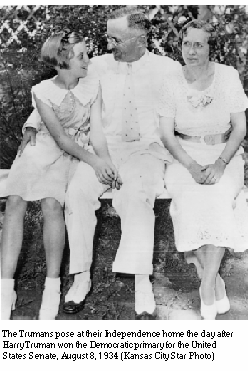
The Science of Government
It was only after this wide range of experience that he determined what he wanted to do, and that, he proudly declared, was to be a politician. Politics often require compromise and for Truman that initially meant joining Kansas City's Pendergast machine. But even as he was in the machine, he was never of it. Over the course of the next two decades his political education grew enormously. He rose from eastern judge to presiding judge of Jackson County during one decade, and then served as a U.S. senator over the next, from 1935 to 1945. By the time he had become Vice President his experience had uniquely prepared him for his role to come. He went literally "from precinct to president," as he liked to say, and the preparation, he would quickly add, was essential. He sometimes ascribed the troubles of his good friend, former President Herbert Hoover, to the fact that Hoover's career in electoral politics started, rather than ended, with the presidency.
As a politician, Truman considered himself a professional man like a physician, clergyman, or a teacher. As he once wrote:
"The good word politics,' which really means the science of government, has been abused in our time, and has been given a definition meaning dishonest management to win an election for a party or a candidate.' The use of the latter definition by newspapers and those who like to turn their noses up at everyday people has obscured the real meaning of the word politics.' A politician is a man who is interested in good government. . . . I would risk my reputation and my fortune with a professional politician sooner than I would with the banker or the businessman or the publisher of a daily paper! More young men and young women should fit themselves for politics and government."
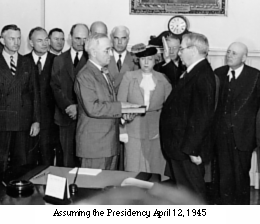
A Record of Action
It was with such thoughts he began his work as a politician in 1923. With the exception of two years out of office 1925 and 1926 he took his own advice. He learned the science of government, and when the telephone call came to Speaker Sam Rayburn's office in the Capitol that sad afternoon after the death of President Franklin D. Roosevelt on April 12, 1945, he was ready.
The Missourian's resultant presidency was remarkable in many ways. Almost immediately, the new president plunged into the main decision-making role in the war, orchestrating the surrenders of Germany and Japan. The Potsdam Conference in July and early August 1945 decided Germany's fate. Truman, along with British Prime Minister Winston Churchill, Churchill's successor, Clement Attlee, and Soviet Premier Joseph Stalin, agreed to divide Germany into occupation zones.
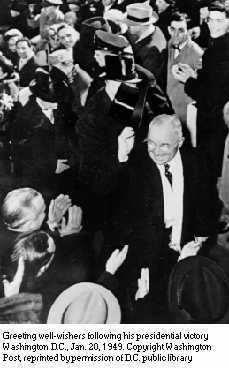
In the Far East, the President faced the momentous decision of whether to drop the atomic bomb on the Japanese cities of Hiroshima and Nagasaki. He decided the answer was yes. None of his presidential decisions created more controversy at that time or later. Truman himself hated the decision, but given the unswerving determination of the Japanese military to continue the war and the number of American lives it would take to bring the war to an end, he concluded that dropping the bomb was necessary. Years later, in 1972, when he was dying in Research Hospital in Kansas City, former Supreme Court justice Tom Clark called upon him. While Truman's physician told Clark he should stay five minutes, Clark stayed 45, for the former president wanted to talk about the atomic bomb and defend what he had done.
When the war ended, the President sought to continue and expand Roosevelt's New Deal programs in what became known as the "Fair Deal." But after more than a decade of reform and war, people, and veterans in particular, were ready for the more placid pursuit of private preoccupations. Whatever Truman may have personally desired was simply irrelevant in the postwar political environment.
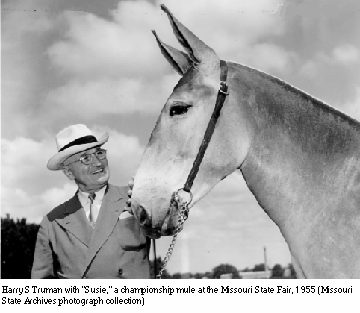
His principal domestic accomplishment, it turned out, was something he had early determined to do to ensure that black Americans received their civil rights. Accomplished largely by executive order, he was unswerving in this purpose. He took on every opponent. He did not hesitate to send a civil rights message to Congress when it necessarily affected his electoral prospects in 1948, and in fact, raised a rebellion within the Democratic party, known as the State's Rights or "Dixiecrat" party. As is oft-told, a reporter at the 1948 Democratic convention asked the then governor of South Carolina, J. Strom Thurmond, about Truman's campaign. "Was he not saying," the reporter asked, "only what President Roosevelt had said?" "I know," was Thurmond's response, "but Truman means it."
Despite his dramatic upset victory over Republican presidential candidate Thomas E. Dewey in 1948, Truman, stymied by a coalition of conservative politicians during his second term, could only trumpet the need for many additional domestic reforms. In the 1960s, often with bipartisan support, many of these proposed reforms eventually became law.
On the foreign policy side, however, he shone. Through a series of great measures in foreign policy, Truman marked the coming of age internationally of the American nation, after a century and a half of political isolation. The Truman Doctrine of 1947 initiated a policy to contain Soviet communism; the Marshall Plan of the same year brought about Europe's recovery from the war; and the signing of the North Atlantic Treaty in 1949 formalized a defensive alliance against Soviet aggression in Europe.
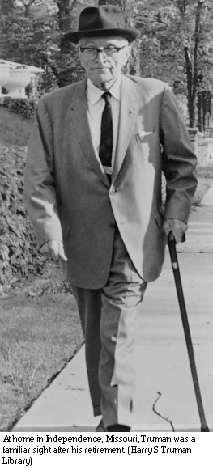
Truman knew, as did most of the country, that the injunctions of Presidents Washington, Jefferson and Monroe could not suit the twentieth century. Presidents Wilson and Roosevelt had taken the country into two World Wars, but their belief was that thereafter the nation could revert to its old role, whether with the League of Nations or the United Nations. Wilson did not think the country needed to keep troops in Europe, and Roosevelt voiced the same sentiments to Stalin. Truman, however, advocated participation in the politics of the world, if not (as Washington actually had recommended) in the ordinary "combinations and collisions" of the nations, then in those that were extraordinary.
Significant, too, was his unhesitating decision to take the nation into the Korean War. Criticism of the involvement arose as the war wore on a great deal of it. It exploded with his firing for insubordination the popular World War II hero General Douglas McArthur as commander of American forces in the Far East. Despite the various criticisms leveled at the administration, Truman believed the war's prosecution essential to the larger world peace. To the Missouri president, it seemed impossible that North Korea could attack South Korea without Russian permission. Truman and his advisers were sure that the USSR was using the North Koreans as a stalking horse, threatening Japan and the entire American position in the Far East. Many years later, in 1993, an American researcher received a document from the former Soviet archives showing that Stalin had indeed given the green light to the North Koreans, and set the date of the invasion.
Everything considered the background of the Missouri president and his extraordinary accomplishments it is possible to say that the state's most famous citizen, the man from Independence, deserves celebration during this present year, 50 years since his assumption of the presidency.
Robert H. Ferrell is the nation's foremost author on Harry Truman's life and presidency. His published works include: The Autobiography of Harry S Truman, compiled from Truman's own writings; Off the Record: The Private Papers of Harry Truman; and Dear Bess: The Letters from Harry to Bess Truman, 1910-1959.
Go to Upset! Harry S. Truman's Whistle Stop Campaign Remembered.